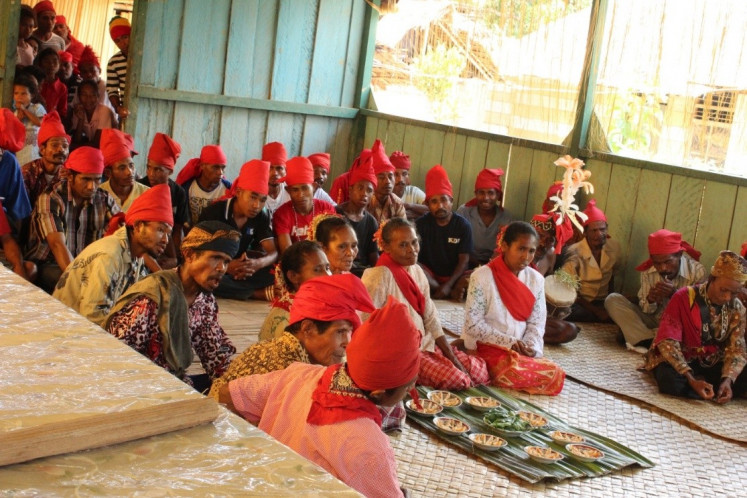Popular Reads
Top Results
Can't find what you're looking for?
View all search resultsPopular Reads
Top Results
Can't find what you're looking for?
View all search resultsSovereign rating upgrade, rosy outlook and history lessons
As with any achievement, we should also be responsibly optimistic to continue managing growth as best as possible.
Change text size
Gift Premium Articles
to Anyone
R
ecent macroeconomic data continue to show a positive outlook on Indonesia’s economic condition. For example, quarterly data from 2015 showed that our gross domestic product growth continues to crawl up. Our GDP continued to grow above 4.9 percent, which can be considered as good.
As a benchmark, recent data shows that the world’s GDP growth rate is at approximately 3.5 percent, while on average, the emerging markets grew at 4.5 percent. Indonesia’s aggregate export shows a positive trend, while investment also continues to grow. This overall positive outlook translated to other assessments.
For example, the June quarterly economic update report by the World Bank acknowledged Indonesia’s sound economic fundamentals. Also, quite recently, the Standard and Poor’s (S&P) upgraded Indonesia’s sovereign rating to investment grade as a reflection of Indonesia’s improved fiscal and monetary management, credibility, and to some extent, economic prospects. This rating upgrade is something that we can be proud of.
As with any achievement, we should also be responsibly optimistic to continue managing growth as best as possible.
History offers valuable lessons. Throughout the history of credit ratings, we can see that it is basically an opinion. In the context of sovereign rating, specifically, it is an opinion on the creditworthiness of a sovereign government and it is not a country risk rating, according to S&P in 2014.
Although we can sure that caution and best practices were all carried out to ensure that the ratings were well-informed, in some cases, although not specific to sovereign ratings, there have been instances of ratings failures, such as those earlier reported by the International Monetary Fund (IMF) and The Economist weekly.
Perhaps the most recent and major credit rating failures can be observed in the case of mortgage backed securities (MBS) ratings. Major credit rating agencies gave many mortgage securities prime rating — i.e. rating grade that signifies extremely or very strong ability to meet financial commitments.
Nonetheless, in 2008, we began to understand that a lot of the prime-rated MBS were subprime. Some investors were caught off-guard, while vigilant investors escaped the calamity. If you watched The Big Short, a movie recounting the subprime mortgage crisis, it seems reasonable to infer that as a consumer of information, it is not enough to trust, but we need to be willing to do our homework, and seek additional data as detailed and as systematic as possible, and verify the information according to our best ability.
It is not easy and it is costly to do so, but perhaps it’s about the best way to be a responsible consumer of information.
Another crucial historical lesson from rating failures and subsequent corrections is also observed in the case of sovereign ratings. For example, sovereign rating corrections occurred in the cases of Thailand, Indonesia, South Korea, Malaysia, Romania, Argentina, Moldova, etc. around 1997-2002, as reported in IMF in 2002. While rating failures seem rare and are hopefully increasingly improbable, some past rating failures maybe could have been prevented had there been higher quality detailed data and more analysis.
Data of various granularity level and scope is important. Both Noble laureates Amartya Sen and Joseph Stiglitz have argued that what we measure affects what we do. Had there been more awareness by market participants and more attention paid to the right or comprehensive set of data or indicators, there might have been less euphoria or irresponsible optimism on the prime-rated MBS that caught the world off-guard in the years prior to the subprime mortgage crisis.
Countries, investors, and all stripes of market participants continue to learn from history and become increasingly diligent in collecting and analyzing data from various sources. And in this digital era, in many countries, private sectors too increasingly possess valuable data that can useful for public policy.
Thus, we too, must be both proud of the positive acknowledgment that international parties have given to us while continuing to do our homework, diligently searching and being open to various data sources. This way we may not only identify weaknesses (if any), but also uncover opportunities for equitable inclusive growth.
---------------
We are looking for information, opinions, and in-depth analysis from experts or scholars in a variety of fields. We choose articles based on facts or opinions about general news, as well as quality analysis and commentary about Indonesia or international events. Send your piece to academia@jakpost.com. For more information click here.










